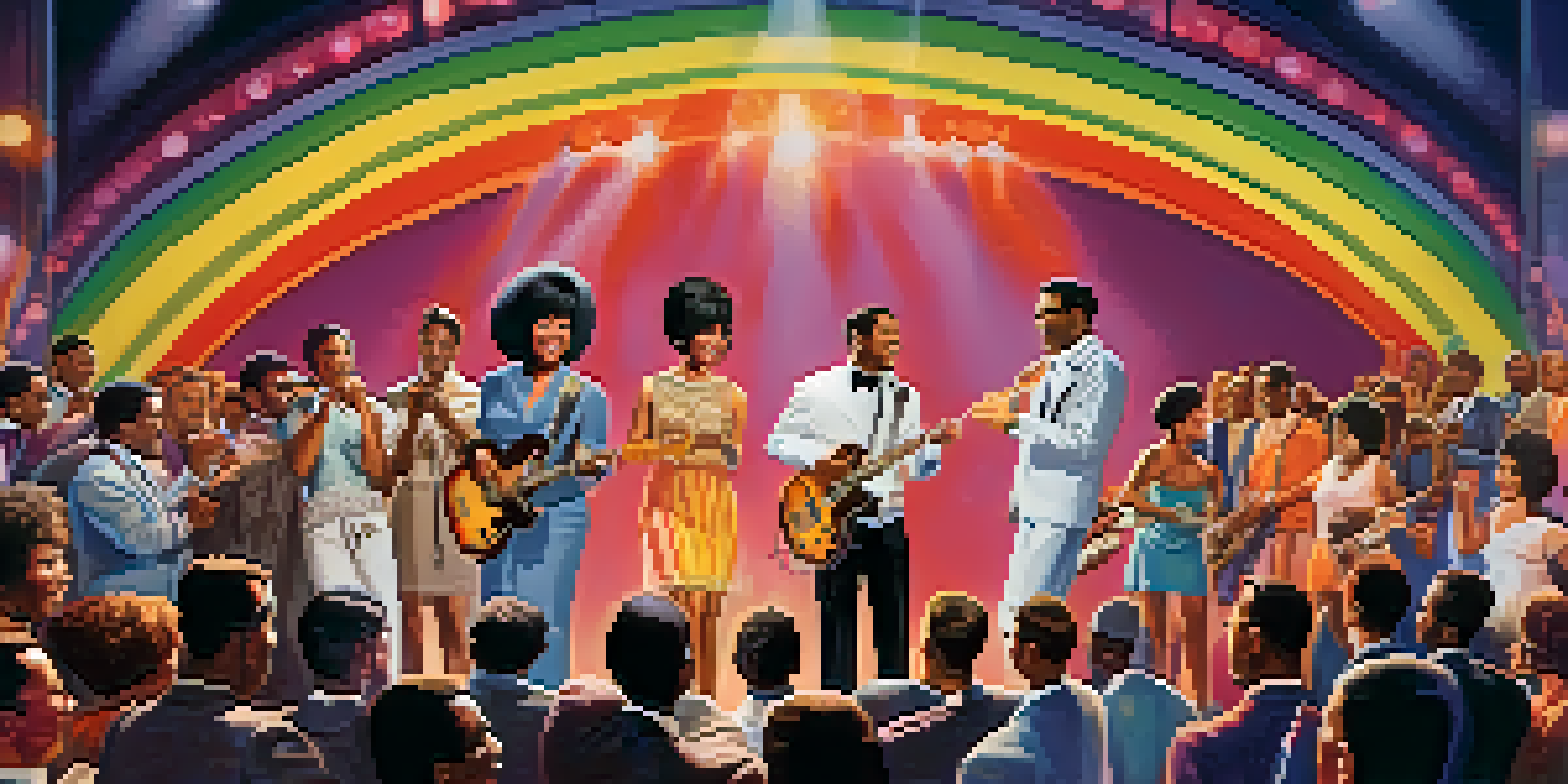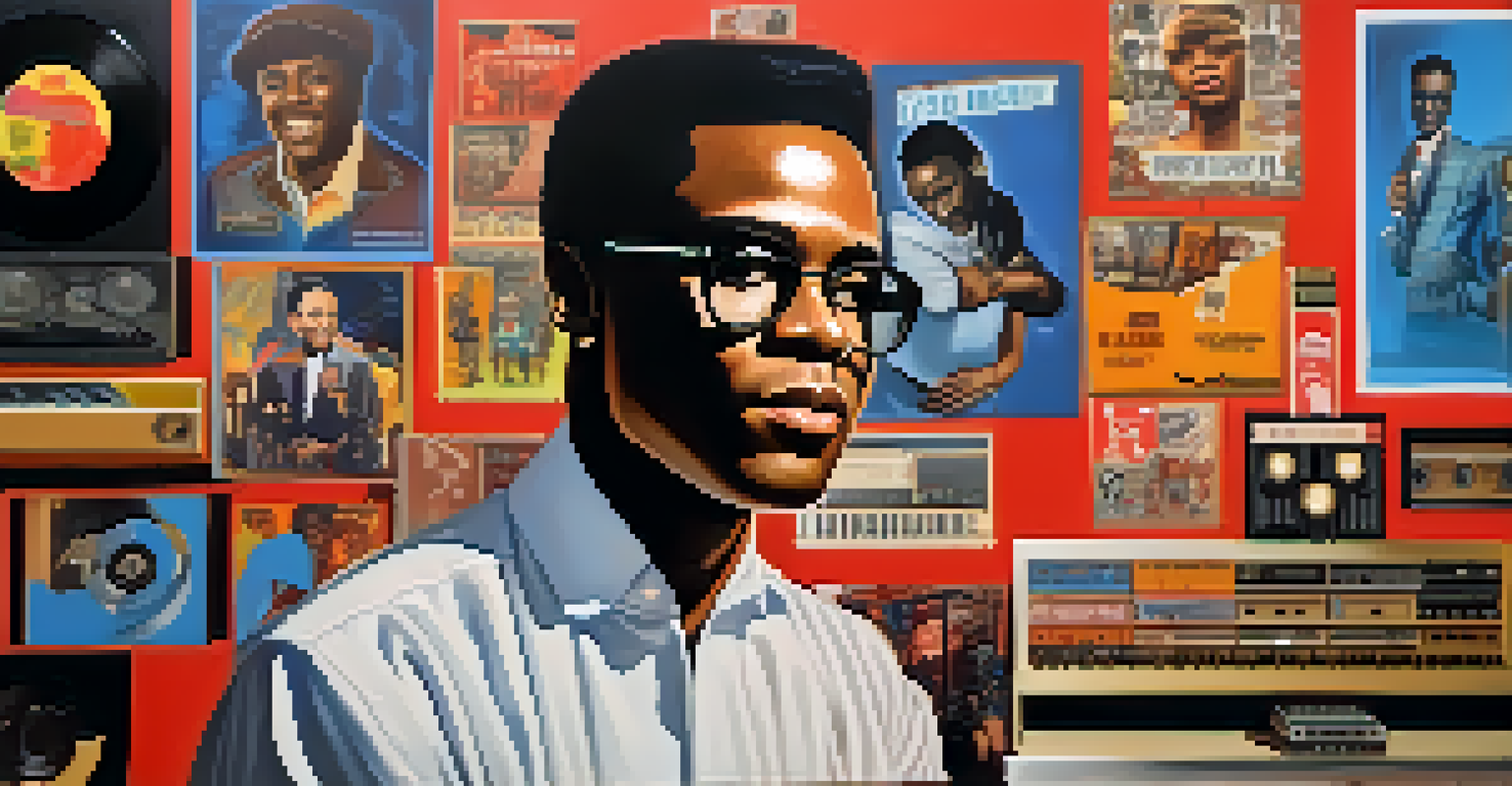The Impact of Motown on American Pop Culture and Identity

The Birth of Motown: A Cultural Revolution
Motown, founded in 1959 by Berry Gordy Jr., emerged as a beacon of hope during a time of social upheaval in America. It was more than just a record label; it became a cultural force that introduced the world to the talents of artists like Diana Ross, Marvin Gaye, and Stevie Wonder. This vibrant music scene not only provided a platform for Black artists but also bridged racial divides in a segregated society.
The Motown sound is a sound of love, a sound of hope, and a sound of unity.
The label's signature sound, a blend of soul, pop, and R&B, resonated across demographics, making it accessible to a broader audience. Hits like 'My Girl' and 'I Heard It Through the Grapevine' were not just chart-toppers; they were anthems of a generation. By gaining popularity among diverse groups, Motown began to change perceptions of Black culture in America.
Beyond music, Motown's influence extended to fashion and lifestyle, introducing trends that would shape pop culture for decades. The polished images of its artists and their vibrant performances set new standards for entertainment. Thus, the birth of Motown marked a significant turning point in American cultural history.
Motown's Role in the Civil Rights Movement
During the 1960s, Motown became an important ally in the fight for civil rights, using its platform to raise awareness about social issues. Artists like Marvin Gaye and Stevie Wonder infused their music with messages about love, equality, and justice, reflecting the sentiments of the era. Songs like 'What’s Going On' became anthems for change, capturing the struggles and aspirations of African Americans.

Motown's influence reached beyond the music; it inspired a generation to engage in activism and advocate for social justice. The label's artists participated in rallies and events, using their fame to amplify the voices of those fighting for equality. This connection between music and activism solidified Motown's place in history as not just an entertainment powerhouse but also a catalyst for social change.
Motown: A Cultural Revolution
Founded by Berry Gordy Jr. in 1959, Motown became a transformative cultural force that showcased Black talent and bridged racial divides in America.
The partnership between Motown and the Civil Rights Movement showcased the power of music as a unifying force. It illustrated how art can influence public opinion and inspire collective action, highlighting the deep connection between cultural expression and social progress.
The Motown Sound: Defining a Genre
The distinctive Motown sound, characterized by its catchy melodies, vibrant instrumentation, and smooth vocal harmonies, has left an indelible mark on music. This unique blend of genres not only defined Motown but also influenced countless artists and genres that followed. The driving beat and lush arrangements made Motown songs instantly recognizable and widely appealing.
Music is a world within itself; it's a language we all understand.
Producers like Smokey Robinson and Norman Whitfield crafted timeless classics that transcended genre boundaries. Their innovative approaches to songwriting and production set new standards in the music industry, inspiring future musicians to experiment with their sounds. As a result, Motown not only shaped its own era but also laid the groundwork for modern pop and R&B.
Even today, the influence of the Motown sound can be heard in the works of contemporary artists across various genres. From hip-hop to pop, the rhythmic and melodic elements pioneered by Motown continue to resonate, showcasing the label's lasting impact on the music landscape.
Motown's Global Reach and Influence
While Motown's roots are deeply embedded in American culture, its influence has transcended borders, reaching audiences worldwide. The universal themes of love, heartbreak, and joy found in Motown songs resonate with people from all walks of life. This global appeal has helped to popularize not just the music but also the cultural ethos of the era.
International artists have drawn inspiration from the Motown sound, incorporating its elements into their own music. The label's artists have toured extensively, bringing the Motown experience to countless countries and cultures. This exchange has fostered a sense of connection and understanding through music, illustrating the power of art to bridge cultural divides.
Music as a Catalyst for Change
During the Civil Rights Movement, Motown artists used their platform to promote messages of love and justice, inspiring activism and social progress.
The impact of Motown on global pop culture is evident in the countless tributes and covers of its classic songs. From films to stage productions, the legacy of Motown continues to be celebrated, ensuring that its spirit lives on in the hearts of fans around the world.
Motown and the Evolution of Black Identity
Motown played a pivotal role in shaping Black identity in America during a transformative period. By presenting a polished and professional image of Black artists, it challenged prevailing stereotypes and showcased the diversity and richness of Black culture. This shift in representation helped foster a sense of pride and empowerment within the African American community.
The success of Motown artists demonstrated that Black talent could achieve mainstream recognition and commercial success, paving the way for future generations. The label's commitment to quality music and production set a benchmark that encouraged Black artists to pursue their dreams without compromise. This evolution of identity was not just about music; it was about asserting dignity and respect in a society that often marginalized Black voices.
As Motown artists broke barriers, they inspired younger musicians to embrace their heritage and express their stories authentically. The legacy of Motown continues to encourage artists to celebrate their roots while striving for excellence in their craft.
Motown's Legacy in Modern Pop Culture
The influence of Motown is still palpable in today’s pop culture, where its songs and artists remain iconic. From movies like 'Dreamgirls' to Broadway productions celebrating its music, Motown's legacy lives on. These adaptations not only pay homage to the original artists but also introduce their timeless music to new generations.
Many contemporary artists cite Motown as a significant influence in their work, emulating its signature sound and style. The rhythmic hooks and emotional storytelling that defined Motown can be found in the music of today's pop, R&B, and hip-hop artists. This ongoing homage is a testament to the lasting impression Motown has made on the music industry.
Legacy of Global Influence
Motown's universal themes and distinctive sound continue to resonate worldwide, influencing contemporary artists and pop culture across generations.
Additionally, Motown has become a cultural reference point, symbolizing an era of creativity and change. Its impact goes beyond music, influencing fashion, dance, and even social movements, making it a cornerstone of American pop culture.
The Future of Motown: A Cultural Touchstone
As we look to the future, the legacy of Motown remains a vital part of American culture. Its music continues to be celebrated, reminding us of the power of creativity and collaboration in bringing people together. New artists are emerging, motivated by the stories and sounds that defined an era, ensuring that Motown's influence will persist.
The ongoing revival of interest in vintage music and culture has led to a renewed appreciation for Motown's contributions. Festivals, tribute concerts, and documentaries continue to educate audiences about its history and significance. This sustained interest serves as a reminder of the importance of preserving cultural heritage and celebrating artistic achievements.

Ultimately, Motown stands as a cultural touchstone that represents resilience, creativity, and unity. Its music not only shaped a generation but also paved the way for future artists to dream big and break barriers, keeping the spirit of Motown alive for years to come.